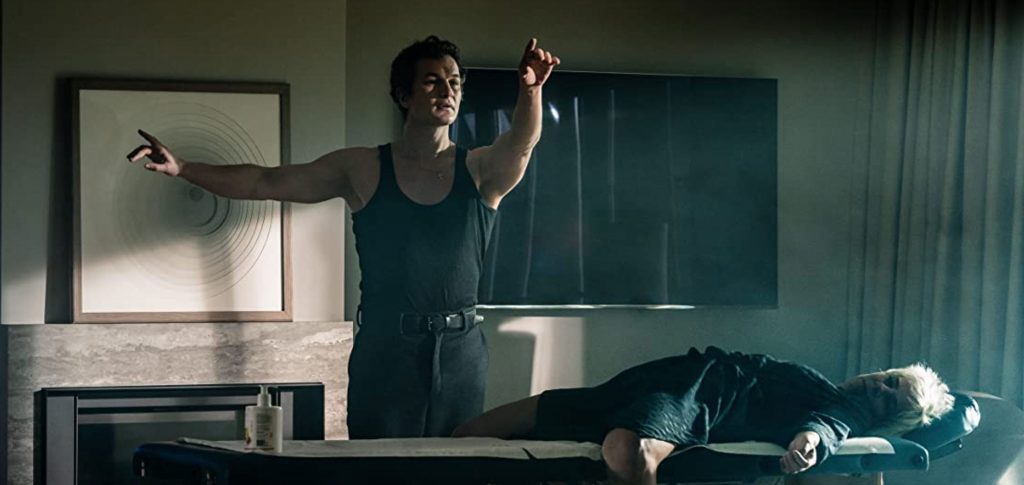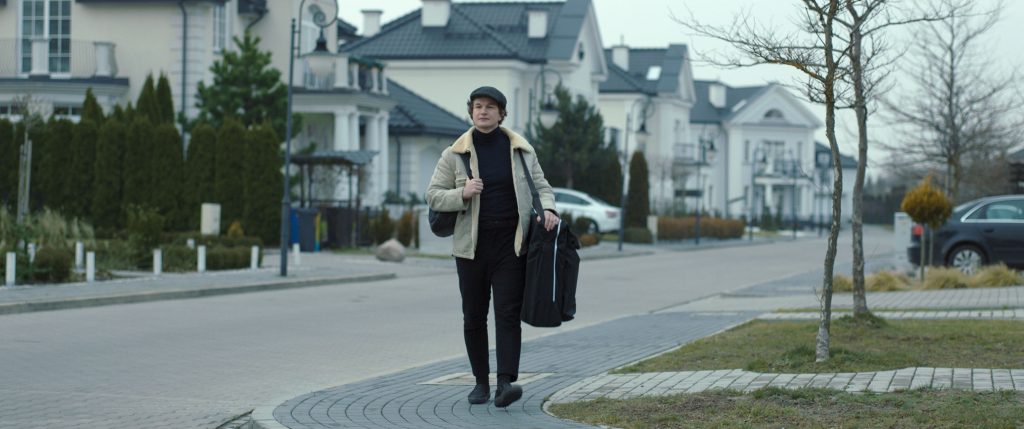Agata Kulesza, Alec Utgoff, Andrzej Chyra, drama, Katarzyna Figura, Krzysztof Czeczot, Lukasz Simlat, Maciej Drosio, Maja Ostaszewska, Malgorzata Szumowska, Michal Engler, movies, Never Gonna Snow Again, Olaf Marchwicki, Poland, reviews, Weronika Rosati
August 17, 2021
by Carla Hay

Directed by Małgorzata Szumowska and Michał Engler
Polish, Russian, French and Vietnamese with subtitles
Culture Representation: Taking place in an unnamed city in Poland, the dramatic film “Never Gonna Snow Again” features an all-white cast of characters representing the working-class and upper-middle-class.
Culture Clash: A Ukrainian immigrant works as a masseur for well-to-do people in a Polish neighborhood, and he has the power to hypnotize them to try to help them solve their emotional problems.
Culture Audience: “Never Gonna Snow Again” will appeal primarily to people who are interested in artsy European films that leave much of the movie open to interpretation.

“Never Gonna Snow Again” is sure to inspire thoughts and discussions about who the mystery man is at the center of this artsy and often-eccentric drama. Is he a supernatural being? Is he a psychic? Is he someone or something else? Don’t expect the movie to reveal this information because it’s a question that is deliberately left so open-ended, there is no right or wrong answer. The movie is an intriguing but sometimes slow-paced portrait that quietly observes issues related to social classes and the environment, as well as the ripple effects of compassion.
Written and directed by Małgorzata Szumowska and Michał Engler, “Never Gonna Snow Again” offers subtle and not-so-subtle commentaries on the class divides between servants and the well-to-do people who employ them. It’s the age-old debate about money versus happiness, and how these two universal human pursuits could be intertwined or not related at all. The people who employ an enigmatic masseur in “Never Gonna Snow Again” at various times have to come to terms with how they reconcile their money with their happiness.
In the beginning of “Never Gonna Snow Again,” masseur Zhenia (played by Alec Utgoff) is in an office meeting with an unnamed older gentleman, who has the power to approve where Zhenia will live next. The movie never really describes what type of official is presiding over this meeting, but viewers might assume it’s some type of immigration officer. Zhenia, who is originally from the Ukraine, points to a map of Poland and tells him, “I want to live here.” (“Never Gonna Snow Again” was actually filmed in Ireland, but the filmmakers Szumowska and Engler are Polish.)
The official makes a reference to Russia’s 1986 Chernobyl nuclear power plant disaster, by saying to Zhenia: “You were born seven years before the disaster, on the very same day. Perhaps you are radioactive. I feel very strange around you. Please help me.” Zhenia then gets up, stands behind the man, and holds the man’s head in both of his hands and begins massaging. Zhenia calmly tells the man that Zhenia is taking away the man’s misery and sickness.
It’s here that viewers first see that Zhenia has the power to hypnotize. The man relaxes and then seems to lose consciousness or appears to be in a deep trance with his eyes closed. Zhenia takes advantage of the moment to forge the man’s signature on some documents and use the official stamp on the desk to legitimize the documents. Zhenia then takes the documents and leaves with the large black case that he always carries with him. What’s in the case? His fold-out massage table.
Zhenia is next seen in an upscale neighborhood in Poland, where he begins work as a masseur to men and women. It’s a gated community where neighbors either know each other or seem to know each other’s business. As time goes on, Zhenia gets more clients through word of mouth.
Because of the intimate nature of his massage work, Zhenia’s clients end up confiding in him about things that bother them. Sometimes they make confessions while awake, while other times they say personal things out loud while under hypnosis. Zhenia doesn’t take advantage of any of his clients when they’re under hypnosis.
His main motivation for the hypnosis seems to be to ease their troubles. However, he doesn’t always get their permission to hypnotize his clients. The movie doesn’t seem to make a judgment one way or the other about how ethical or unethical Zhenia is with his hypnosis techniques. However, he does get more emotionally attached to some clients compared to others.
The people who end up becoming Zhenia’s massage clients are all middle-aged and all live in the same neighborhood:
- Maria (played by Maja Ostaszewska), a married mother of three underage kids—two daughters and one son—who don’t seem to like her very much. Maria is a heavy drinker (she guzzles wine and liquor at all hours of the day and night), and she might be an alcoholic. Her unnamed husband (played by Krzysztof Czeczot) is aware of Maria’s drinking problem, but he only points it out to her when she does or says something embarrassing in public.
- Ewa (played by Agata Kulesza), an eccentric widow, who at one point squawks like a pheasant in the movie. She doesn’t approve of the close friendship that her teenage son Jan (played by Maciej Drosio) has with another teenage boy (played by Olaf Marchwicki), who lives across the street and whom Ewa calls “disturbed.” It’s implied that Jan (who’s very quiet and introverted) might be gay and closeted and might be more than friends with his constant companion.
- An unnamed male cancer patient (played by Lukasz Simlat), who has been in and out of remission. He and his wife Ewa (played by Weronika Rosati) have a son together who’s about 8 or 9 years old. Ewa and Zhenia seem to have a mutual attraction to each other, based on the way they exchange glances when Zhenia comes over to visit.
- An unnamed single woman (played by Katarzyna Figura), who lives with her three male French bulldogs, whom she treats as her children. The dogs’ names are Hugo, Borys and Filip.
- An unnamed retired army soldier (played by Andrzej Chyra), who has the reputation of being the crankiest person in the neighborhood.
“Never Gonna Snow Again” makes multiple references to Chernobyl, because it’s revealed that Zhenia is from the northern Ukraine city of Pripyat, which is near Chernobyl. The nuclear explosion at Chernobyl caused snow-like dust and debris. And it’s hinted at that Zhenia’s family was destroyed over the Chernobyl disaster. Therefore, anything that looks like snow might cause bad memories for Zhenia.
Zhenia has brief flashbacks to his childhood, which give more clues of how the Chernobyl tragedy affected him and his loved ones. The title of this movie is open to interpretation, but more than once it’s mentioned that people don’t want something like the Chernobyl disaster to happen again. Snow is often used in the movie as a symbol of the environment’s way of healing (during climate change as Earth’s temperature gets dangerously hotter) and as a way of hurting.
“Never Gonna Snow Again” is not the type of movie that will appeal to people who expect the type of movie about neighborhood scandals being revealed or a big mystery being solved by a newcomer to the neighborhood. That would be a very Hollywood treatment of this story. Instead, the movie is more of a “slice of life” look at what happens when people who are so accustomed to putting up certain outward appearances to their neighbors sometimes lose touch with who they really are and their true inner feelings.
Zhenia at times seems to be magical or supernatural figure who helps his clients get in touch with his feelings. But the movie doesn’t come right out who and what his, but rather shows his purpose in the story. He’s saintly, but he’s no angel, since the movie shows that he has very human carnal desires.
Utgoff’s absorbing performance as Zhenia carries the movie in a way that will make viewers curious to know more about Zhenia. But even though Zhenia is skilled at getting people to open up to him emotionally, Zhenia as a character often remains a blank slate, with very little revealed about his past and what he wants out of life. (For example, when one of his clients asks Zhenia about his love life, he avoids answering the questions by saying he’s too busy to date anyone.)
In that sense, “Never Gonna Snow Again” is very much like coloring book that deliberately hasn’t been filled in yet. Viewers have to decide for themselves what contextual shades they want for this story so that the story can mean something to them. And for people who don’t want to do that, it might be better to leave this movie alone because there might be too much ambiguity for the movie to be enjoyable.
Kino Lorber released “Never Gonna Snow Again” in select U.S. cinemas and on Kino Now on July 30, 2021. The movie’s Blu-ray and DVD release date in on September 28, 2021. “Never Gonna Snow Again” was released in Poland on June 4, 2021.
